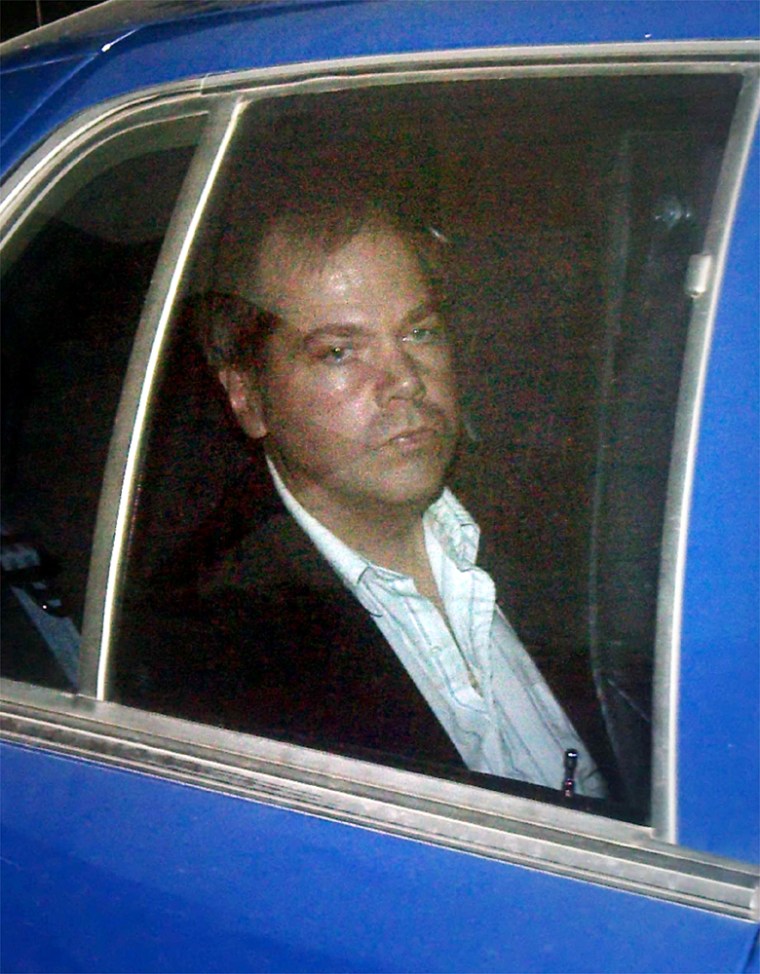John Hinckley Jr., the man who tried to kill President Reagan, won court permission to unmonitored visits with his parents, but the decision was immediately criticized by the former president’s family.
“Although the judge limited Mr. Hinckley’s travel to the Washington, D.C., area, we continue to fear for the safety of the general public,” former first lady Nancy Reagan said in a statement. “Our thoughts are with all of Mr. Hinckley’s victims today, especially Jim Brady and his family, as they must continue to live with the tragic consequences of the assassination attempt.”
Son Michael Reagan also criticized the decision. “Can we trust two 80-year-old parents, if he gets off of his drugs, to do the right thing and get him back into a hospital where he belongs or stop him from hurting himself or hurting others?” he asked on ABC’s “Good Morning America.”
“They’re saying, 'He’s fine, he’s on his meds,”’ Michael Reagan said. “He gets off his meds, does that mean everybody has to duck?”
He said that Hinckley has never apologized to the victims or to the families of the people he wounded. Reagan noted that his father suffers from Alzheimer’s disease and is being cared for at home in California. Nancy Reagan, Michael Reagan said, has “enough to deal with” without knowing “that the man who shot her husband is now going to be free to roam.”
Ruling specifics
U.S. District Judge Paul Friedman on Wednesday ruled that Hinckley may have six visits with his parents in the Washington area without staff from the mental hospital where he has lived for more than two decades. Each visit may last 12 hours. If they go well, he and his parents may be allowed two 32-hour overnight visits within 50 miles of the capital.
However, he included a number of strict conditions and rejected Hinckley’s request to travel to his parents’ home in Williamsburg, Va., about three hours south of Washington. He said a detailed schedule must be submitted to him two weeks before each unsupervised visit.
While government lawyers fought Hinckley’s request, U.S. Attorney Roscoe Howard Jr. took some solace in that Friedman rejected any visits outside the Washington area.
“In light of the evidence, we believe the court properly denied Mr. Hinckley’s request for overnight and day visits to his parents’ home,” he said. “Our concern, among others, has always been whether Mr. Hinckley will endanger himself or others if granted an unescorted release.”
The Justice Department indicated it was reviewing the order to decide whether to appeal.
Detention since 1982
Hinckley, 48, has lived at St. Elizabeths Hospital in Washington since 1982, when he was acquitted by reason of insanity in the shootings of Reagan, presidential press secretary James Brady and two law enforcement officers. Reagan was nearly killed and Brady was permanently disabled. Hinckley said he shot Reagan to impress actress Jodie Foster.
Hinckley has been allowed supervised visits off the hospital grounds for several years and has made about 200 such trips to theaters, bowling alleys, beaches and bookstores.
Hospital officials have said there have been no problems with Hinckley on his supervised trips away from the hospital. The Secret Service watches Hinckley whenever he leaves the hospital.
During five days of hearings on Hinckley’s request, psychiatrists testifying for Hinckley, the government and the hospital said his mental health had improved to the point where he would not be a threat to himself or others if he were to leave the hospital for visits with his parents.
“Every expert . . . -- not only Mr. Hinckley’s expert witnesses but also the expert witness retained by the government — have expressed their opinion that under a highly structured, limited conditional release, Mr. Hinckley will, to a reasonable medical certainty, not be a danger to himself or others,” Friedman said in a 50-page opinion.
Hinckley’s lawyer, Barry Levine, said his client was entitled under the law to receive unsupervised visits, and the judge’s conditions should alleviate any concerns about public safety.
“The rule of law applies equally to Mr. Hinckley as to everyone else,” Levine said. “An opposition based on fear or an opposition based on a need for revenge or a sense of bitterness is an opposition that is sadly but woefully misplaced.”
Daniel Dodson, a spokesman for the National Association of Criminal Defense Lawyers, said it was not unusual for people found not guilty of a crime by reason of insanity to receive unsupervised visits as their mental health improved.
“The whole purpose of putting them in an institution is to make them better,” Dodson said. “If this case was not such a high profile case, this would not be an action that anyone would be taking a look at.”
